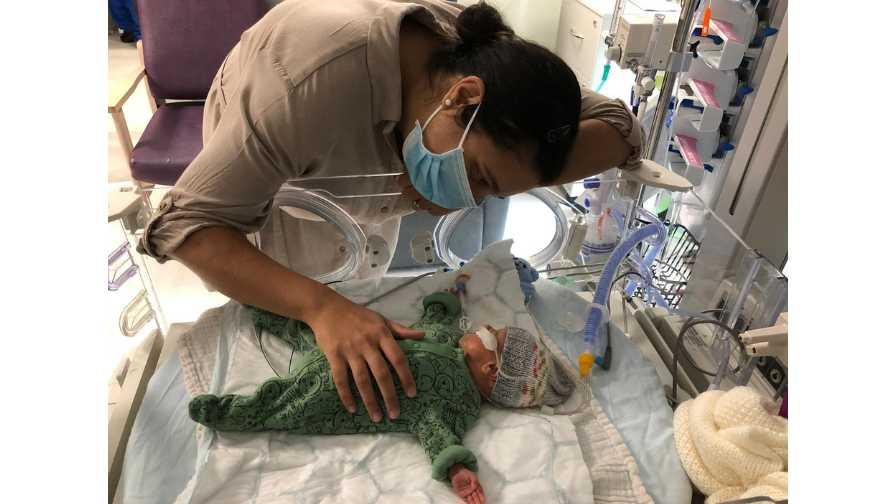New research funded by charities Action Medical Research and Borne that aimed to identify the proteins in the uterus that could have a role in the contractions that cause premature birth, has been a success. Around 55,000 babies are born prematurely in the UK each year1,2 and sadly, around 1,000 lose their lives as a result of being born too soon.3,4,5 Children who survive are at an increased risk of cerebral palsy, visual impairment, hearing loss and learning difficulties. This research could ultimately lead to new treatments to prevent premature birth, changing and saving the lives of thousands of babies in the UK.
Zalena’s son Sam, who was born extremely prematurely, at 24 weeks, in 2020 during the height of the COVID-19 pandemic, spent almost four and a half months in the neonatal unit. At five days old he developed the life-threatening complication necrotising enterocolitis (NEC), a condition where tissue in the bowel becomes inflamed6 and had to have emergency surgery to remove part of his bowel.
Zalena comments: “The first few months of Sam’s life were a rollercoaster as he had so many complications including a collapsed lung, temporary lung and kidney failure and infections. At one stage we thought that he might lose his sight as he developed the most aggressive form of retinopathy of prematurity, a condition when abnormal blood vessels grow in the retina. Sam needed three lots of injections and laser surgery to save his sight. Before this happened to us, we had no idea that the journey would be so volatile and emotional. It’s shocking that thousands of families go through this every year. This is why we are calling for more research.”

The researchers found that many proteins are found in greater quantities in uterine smooth muscle when compared to the smooth muscle in the arteries supplying the placenta and the uterus. Identifying the proteins in uterine smooth muscle, which cause the contractions associated with labour and therefore spontaneous premature birth, will enable researchers to test existing and new drugs to see if they can prevent smooth muscle contraction in the uterus.
Professor Michael J Taggart, Chair of Reproductive Sciences, Newcastle University, says: “This research is significant as it is the first time that we have been able to read a molecular map of the proteins in smooth muscle in three distinct tissues: the uterus and the arteries supplying blood to the uterus, and within the placenta. Knowing now that some proteins are found in larger quantities in uterine smooth muscle compared to smooth muscle in the arteries supplying the placenta and the uterus, means we can develop and test drugs that relax smooth muscle of the uterus without having unwanted effects on muscles of the arteries supplying the womb and placenta.”
The results from this study are a step forward and build on the success of previous research, where the researchers demonstrated that the arteries supplying the placenta and the uterus react differently to drugs. This research is critical as the molecular mechanisms that cause premature birth are not well understood. The Department of Health, National Maternity Safety Strategy, in 2017, set a target to reduce the national rate of preterm births from 8% to 6% by 2025.7 As of 2021,the current rate of premature birth in England was 7.6%.
Action Medical Research are pioneers in funding early-stage research that has led to several successes including helping to develop ultrasound scanning in pregnancy and discovering the importance of taking folic acid during pregnancy to prevent spina bifida. “This research will provide greater understanding of the proteins and mechanisms involved in preterm labour which is the starting point for identifying and testing whether new or existing treatments can prevent premature birth,” says Dr Caroline Johnston, Senior Research Manager, Action Medical Research.
“This ground-breaking work by Prof Taggart has allowed us to better understand the mechanistic causes of pre-term birth, and as a result we will now be better placed to inform the development of new, more efficacious drug treatment strategies to prevent babies from being born too soon.” says David Badcock, Chief Executive Officer at The Borne Foundation.
Action Medical Research and Borne joined forces back in 2016 when they pledged to work together to help babies born too soon and attract more funding to this vital area of research. Since then, together they have invested over £1,421,068 into eight research projects to further our understanding of why babies are born prematurely, diagnose women for their risk of preterm labour early in their pregnancy, and develop new treatments to help reduce the numbers of babies being born too soon. The two charities continue to work together and have pledged to fund a further £500,000 together in this area.
Find out more: www.action.org.uk/research/reducing-risk-preterm-birth.
